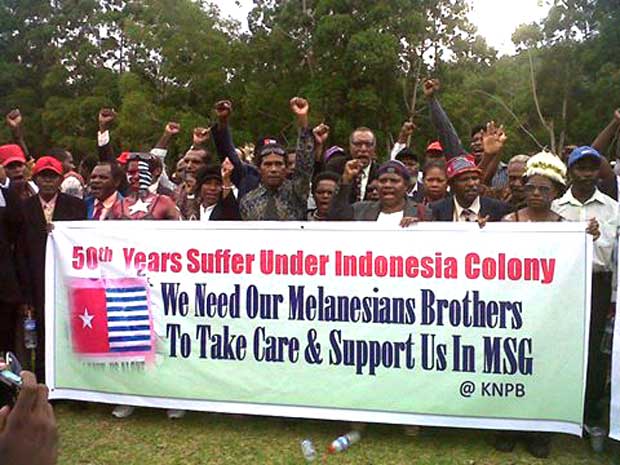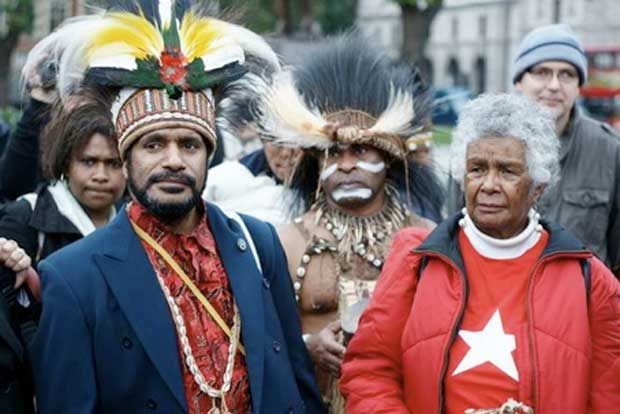There is a silent genocide in his homeland of West Papua, independence leader Benny Wenda says, but it is slowly becoming difficult for the world to ignore.
“A lot more people are talking about it, a lot more people are finding out the truth,” he tells New Matilda.
“Because it is happening right now. A lot of people from Australia and New Zealand, and the Pacific, all across the Pacific, in Africa and the Caribbean. I’m telling the world what is happening because this is the 21st century and West Papua is still fighting colonisation. People thought colonialism has ended but Indonesia is still practising it.”
In the past 50 years since Indonesia obtained control over West Papua following the departure of the Dutch, an estimated 500,000 Indigenous Melanesians have died in the resource rich province. But their cries have fallen on deaf ears.
The brutal crackdown from the Indonesian military and security forces is largely hidden from the international radar through a foreign media ban. But now, with the explosion of social media, the atrocities committed are regularly flowing out of West Papua.

In mid-March, Indonesian military opened fire on a group of West Papuans who were fundraising for the victims of Cyclone Pam in Vanuatu in the town of Yahukimo, the only country that has consistently supported a free West Papua. One person died, four were injured, and there are reports of arrests.
“This was humanitarian – it wasn’t talking about independence, but the Indonesian police don’t respect humanitarian issues,” Mr Wenda says.
“Nobody brought justice and people are really scared. Some of them are in hiding but they are continuing to raise funds. Some are singing on the street and collecting money.”
Mr Wenda has been in exile since 2003, when he was offered political asylum by the British government. It followed his escape from a jail in the small town of Abepura, where he was being held as a political prisoner, and was awaiting the outcome of a trial into allegations of inciting an attack on a police station, charges he has consistently denied.
More than a decade later, Mr Wenda is in Australia after he was deported from Papua New Guinea last week on a visa related issue.
He told New Matilda he accepts the PNG government’s reasoning that it was not a political decision.
“I used a British passport and when I arrived I thought you could apply for a visa on arrival. I was held for five hours, I didn’t know what was going on, they didn’t tell me. After two days they decided to deport me. But I understand and respect their law,” Mr Wenda says.
“I don’t want to go into a lot of the speculation that it was a political issue.”
But Mr Wenda arrived in the country to thank PNG Prime Minister Peter O’Neill for recent comments he made against the brutal control of the province by Indonesian military.
Mr O’Neill recently told ABC’s Pacific Beat program that the recently elected Indonesian President Joko Widodo should keep the previous President Susilo Bambang Yudhoyono’s promise to reduce the military presence in the rich province. The matter was discussed with the former President in a meeting held in Indonesia, he said.
“We will try and hold the Indonesian government to that, to make sure that the current government also has the same view about a reduction of presence of military on the island, and of course more autonomy for the people of West Papua,” he said.
Despite the need to take a “diplomatic approach” to the issue of West Papua’s future and have a “cordial relationship with Indonesia”, Papua New Guinea “will not keep quiet about the abuses that are taking place”.
The comments were “shocking” to Mr Wenda, who has said in the past 50 years, no PNG Prime Minister has ever made such strong comments about the future of West Papua.

“My visit to PNG was because in 50 years, no other Papua New Guinea Prime Minister has supported the human rights issue in West Papua,” Mr Wenda said.
“This is also a family issue – we must sort it out amongst the Melanesian family – so I came to PNG to personally thank the Prime Minister and his government.”
Another reason was to personally lobby Papua New Guinea in the lead up to a significant meeting of the Melanesian Spearhead Group (MSG) in the Solomon Islands in July, which will determine whether the United Liberation Movement of West Papua, for which Mr Wenda is a spokesperson, will be included.
The MSG is a regional group made up of Melanesian countries – Vanuatu, PNG, Fiji, the Solomon Islands and the Front de Liberation Nationale Kanak et Socialiste, a pro-independence New Caledonian movement.
As of 2011, Indonesia has observer status at the MSG.
Mr Wenda told New Matilda Mr O’Neill’s comments gave him hope about Melanesian support for a free West Papua.
“Nobody has said a comment or statement like that so I was shocked and it let our spirits up. We thought ‘this has never happened’, that’s why it gave us hope. This is a Pacific issue. It’s a regional issue. That’s why it was a surprise for a Melanesian leader to speak out publicly,” he says.
The situation is urgent, and it is getting worse under President Widodo, who only visited West Papua during his election campaign to gain popularity, Mr Wenda said.
“People thought he was the Indonesian Obama but actually he’s worse. From the beginning I never had trust. You can’t trust them. We are better off going back to where we came from. We are demographically, culturally, linguistically, part of Melanesia,” he says.
Over the past five decades, the Melanesian nation of Vanuatu has been the only country to back a free West Papua, but Mr Wenda says it’s now time for the rest of Melanesia to stand in support.
He says Indonesia has been a key player in keeping the Melanesian countries silent on the issue.
“Indonesia has played clever games, like what happened in 1969 with Indonesia threatening America and the Dutch… the same has been used to get Melanesian countries not to support because they say this is an internal issue, a territorial integrity issue.
“But Melanesian people and leaders are now realising that Indonesia is hiding something. Indonesia does not allow journalists inside and they are committing a secret genocide.”
He believes that the MSG bid will be successful, following on from a meeting of the MSG in Vanuatu last year, where the application for membership was submitted.
“I hope the Melanesian leaders will accept West Papua and welcome West Papua into the Melanesian family. We are campaigning now with our solidarity groups around the world, particularly in Australia, New Zealand the Pacific Islands.
“I really believe we will be a full member.
“We already have a united group with the United Liberation Movement of West Papua, and it gives you confidence.”
Donate To New Matilda
New Matilda is a small, independent media outlet. We survive through reader contributions, and never losing a lawsuit. If you got something from this article, giving something back helps us to continue speaking truth to power. Every little bit counts.



